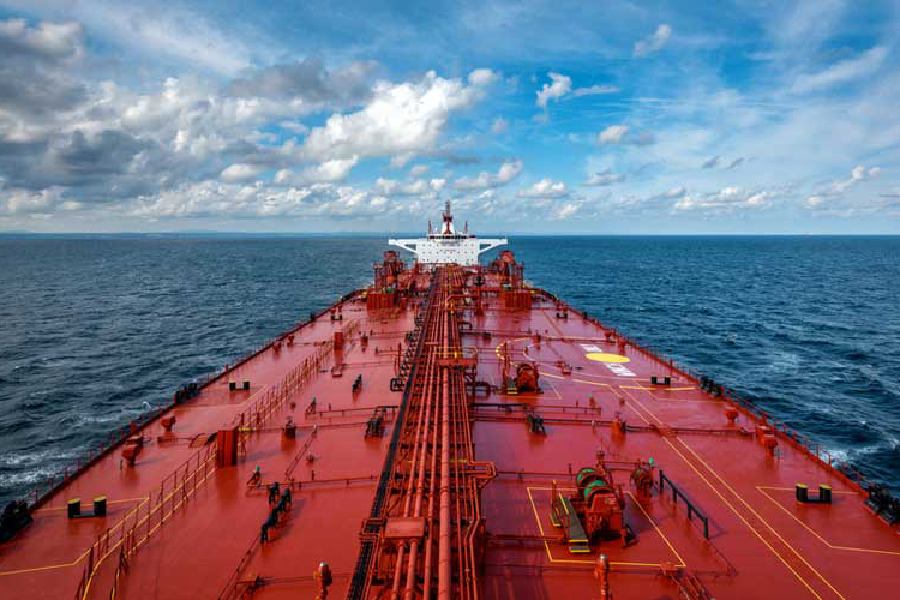It’s a Russian crude oil tanker that'd been sailing nearly two weeks, biding its time, in the Laccadive Sea. The NS Century is waiting for an Indian government green signal to sail into Gujarat’s Vadinar Port to unload its consignment of Russian oil.
The Century is one of five ships that have been sanctioned by the US government for carrying Russian oil that’s being sold at more than $60. That’s the ceiling price fixed by the G7 countries to ensure Moscow’s earnings from its oil exports are squeezed sharply. India has been one of the biggest buyers of Russian oil for more than one year now since the Russia-Ukraine war began.
The government in a dilemma about whether to allow the Century to unload its cargo in Vadinar, which would, in effect, be tantamount to ignoring the US sanctions against the ship.
The IndianOil Corporation and Nayara Energy have oil storage facilities and unload consignments at Vadinar Port. Nayara, which is owned by Russia’s oil giant Rosneft, has denied that the Century’s consignment is bound for it.
Oil industry sources say the Century has carried its last four consignments of Sokol grade crude for IndianOil. One possibility, cited by oil industry experts, is that if the government is reluctant to allow it to dock in Vadinar, the Century may carry out another midsea ship-to-ship transfer. That ship could then bring the crude oil into Vadinar. “I’d be surprised if the cargo doesn’t end up in Vadinar. They’re probably waiting for the dust to settle,” says Viktor Katona, Lead Crude Analyst at Kpler, a global trade intelligence firm.
Century is owned by Russian shipping company Sovcomflot but sails under the Liberian flag. Such arrangements of convenience are common in the shipping industry for tax and other purposes.
Five ships totally have been sanctioned by the US and, out of these, four are Russian-owned. The fifth is a Turkish-owned tanker. Two ships, the Ligovsky Prospect and the Kazan, are thought to be undergoing maintenance and repairs in Chinese ports and repair yards. A third Russian ship, the Primorye is believed to be near Murmansk, the Russian Arctic port. The Turkish ship Yasa Golden Bosphorus is near the US coast.
Century didn’t pick up its consignment from a Russian port but instead did what is called a midsea ship-to-ship transfer off the Korean port of Yeosu. Such ship-to-ship transfers of Russian oil destined for India have become commonplace off the Korean coast.
India has been a key buyer of Russian oil for about 16 months since it began getting large discounts because the US and most of Europe imposed sanctions on it after Russia invaded Ukraine. Previously, India bought only minuscule quantities of Russian oil because transportation costs were high as the sailing time between the two countries is about 30 days. India bought most of its imported oil from the Gulf countries. Saudi Arabia, Iraq and the UAE., which are only about five-six days away.
India’s buying of Russian oil might get difficult if the Americans decided to impose sanctions on more ships. But oil industry experts say the Americans are unlikely to take this too far. “I think they will do it sporadically, so that the Russians don’t feel too much at ease,” says Katona.
The fact is that if Russian oil went totally off the market it would send global prices soaring, quite possibly past the $100-mark, which is the last thing that US President Joe Biden wants with the 2024 elections looming. Prices shot up to a peak of $96 a few months ago when Russia and Saudi Arabia led an effort to cut oil production and thus force up prices.
Also, the US has been buying large quantities of a refined oil product called VGO from both Reliance Energy and Nayara Energy, both of which are making large crude purchases from Russia. VGO is used with transportation fuels, specifically diesel.










